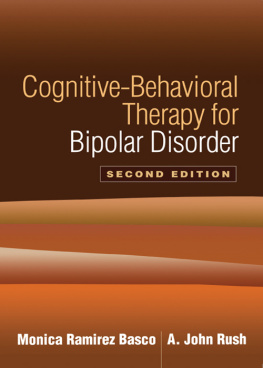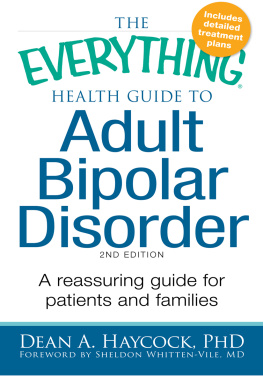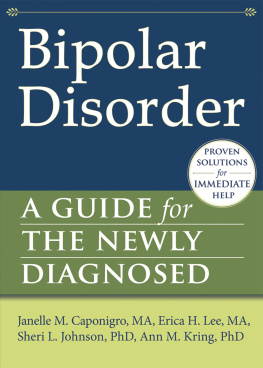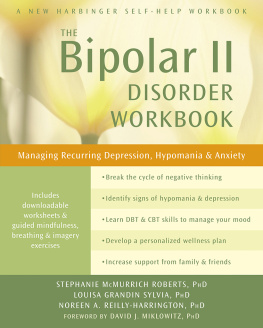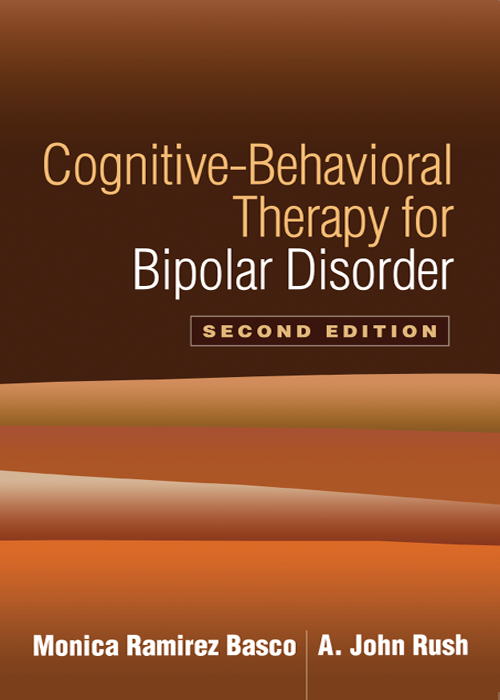2005 The Guilford Press
A Division of Guilford Publications, Inc.
72 Spring Street, New York, NY 10012
www.guilford.com
All rights reserved
2005 Epub Edition ISBN: 9781606237762
Paperback edition 2007
No part of this book may be reproduced, translated, stored in a retrieval system, or transmitted, in any form or by any means, electronic, mechanical, photocopying, microfilming, recording, or otherwise, without written permission from the publisher.
Last digit is print number: 9 8 7 6 5 4 3 2
Library of Congress Cataloging-in-Publication Data
Basco, Monica Ramirez.
Cognitive-behavioral therapy for bipolar disorder / Monica
Ramirez Basco, A. John Rush.2nd ed.
p. cm.
Includes bibiographical references and index.
ISBN-13: 978-59385-484-3 (pbk.)
ISBN-10: 1-59385-484-6 (pbk.)
ISBN-13: 978-1-59385-168-2 (hardcover)
ISBN-10: 1-59385-168-5 (hardcover)
1. Manicdepressive illnessTreatment. 2. Cognitive
therapy. I. Rush, A. John. II. Title.
RC516.B36 2005
616.89506dc22
2005008775
In memory of
David Walter Savage
19572003
Monica Ramirez Basco, PhD, is a clinical psychologist, author, lecturer, and researcher. She recently joined the psychology faculty at the University of Texas at Arlington. She is an internationally recognized expert in cognitive-behavioral therapy (CBT) and a founding fellow of the Academy of Cognitive Therapy. Dr. Basco is the author of Never Good Enough: How to Use Perfectionism to Your Advantage without Letting It Ruin Your Life and coauthor of Getting Your Life Back: The Complete Guide to Recovery from Depression and The Bipolar Workbook: Tools for Controlling Your Mood Swings, a CBT guide for patients.
A. John Rush, MD, is Professor of Psychiatry and Vice Chair, Department of Clinical Sciences at the University of Texas Southwestern Medical Center at Dallas. His work has focused on the diagnosis and psychotherapeutic, psychopharmacological, and somatic treatment of major depressive, bipolar, and other mood disorders. He has authored 10 books and over 400 journal articles. Dr. Rushs internationally recognized work has received numerous awards. Most recently, his research has focused on longer-term disease management programs, including multistep treatment algorithms for bipolar and major depressive disorders.
Since the publication of the first edition of this book in 1996, we have had many opportunities to implement and evaluate our cognitive-behavioral strategies for containing the symptoms of bipolar disorder and for prevention of relapse. We have trained clinicians and researchers across the United States, in South America, and in Europe to use these methods in clinical settings. And other investigators have worked with and modified our strategies for application to their unique patient populations with good results. Also over the 9 years since our original publication, new pharmacological treatments for bipolar disorder have been developed, tested, and found efficacious. Indeed, these are exciting and hopeful times.
Several challenges remain for clinicians and researchers. Better detection methods are needed so that this illness can be recognized and addressed earlier in its course. Medical and behavioral strategies must be strengthened so that those with the illness will have fewer residual symptoms of depression between episodes of mania and major depression. Methods are needed to help patients use their treatment resources more consistently so that they can receive the maximum benefit available. These include clinical strategies that enhance adherence to medical treatments and improvements in psychopharmacological agents so that medications can be better tolerated. We must also aid the efforts to destigmatize mental illness so that people can feel more comfortable seeking psychiatric and psychological care. Taken together, these improvements will help people gain a better sense of control over their symptoms and help them to achieve greater quality of life.
The methods presented in this second edition of Cognitive-Behavioral Therapy for Bipolar Disorder represent another step toward the development of clinical methods for preventing relapse and for helping patients to live with this illness. Its organization is different from that of the first edition, to allow more flexibility for clinicians. Rather than providing specific session-by-session instructions, it guides clinicians toward selecting methods that address the stage of illness and treatment and tailoring the intervention to the specific problems and needs of patients.
Our experience has shown us that people with bipolar disorder and their family members are often very active in seeking ways to improve their health, to stay abreast of recent developments in treatment, and to experiment with ways to control their symptoms. The members of the Depression and Bipolar Support Alliance groups across the United States as well as other self-help groups continue to make it their mission to support and educate themselves and one another, to convey hope, and to challenge the fields of psychiatry and psychology to assist them in finding new ways to improve the quality of their lives. Because people with this illness are able to play an active role in their care, they read about and make use of treatment methods available through therapy, in journal and magazine articles, through the visual media, and through books. As educated consumers, they often enter treatment already having implemented many of the methods we suggest in this book. The flexibility of the methods described herein will allow clinicians to bypass components of treatment about which the patient has knowledge and skills and move ahead to the more advanced methods offered for controlling depression and mania.
Before the cognitive-behavioral methods provided in this text can be of help, the patient must be ready to deal with the fact that he or she has a chronic and severe mental illness. This concept is very difficult for people to accept. Our natural inclination as human beings is to push away bad news. Thus, providing therapy and making it a successful experience is as much about the timing being right as it is about the methods being useful. If the patient is intellectually ready to learn to manage his or her symptoms but is not emotionally ready to fully grasp the meaning of having this life-long disorder, there will be many roadblocks on the path to recovery. Steps toward managing the symptoms may be followed by periods of frustration and anger with the enterprise, perhaps even the desire to give up on treatment altogether. It may be necessary to postpone psychotherapy or put it on hold while the person allows him- or herself time to grieve the loss of full mental health and of a life uncomplicated by depression and mania, medications and therapy, and doctors and hospitals. Patience is needed by both clinicians and patients to allow the normal process of acceptance to occur and adjustment to solidify. When the patient is ready, the cognitive-behavioral methods presented in this volume can help him or her to regain control, to prevent succumbing to the peaks and valleys of the illness, and to improve the quality of his or her life.
There is still much to be learned about the management of bipolar disorder, and our patients have much to teach us. If only we can maintain the sense of purpose as clinicians and researchers that brought us to the mental health field, we can persevere to find answers to the significant problems posed by this chronic and debilitating illness.

